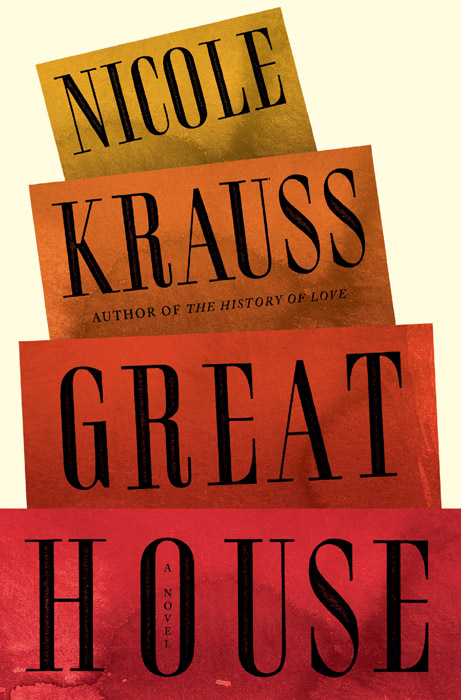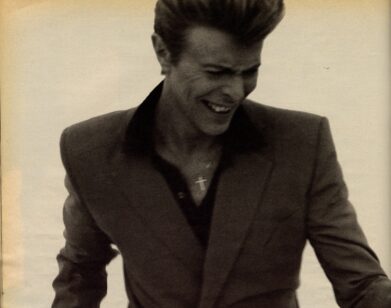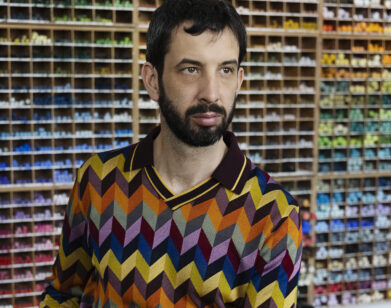Nicole Krauss’ Plot Thickens

Reading a plot summary of any of Nicole Krauss’s three novels—Man Walks into a Room (2002), The History of Love (2005), or Great House, which came out just last month—you’ll shuffle through innumerable convoluted narrative twists. You’ll meet characters from the past and present, from this country and that religion; people seem to have no business being seated next to each other on a plane, let alone sharing the intimacies of the printed page. Where else but in Great House would a frosty middle-aged New York writer end up riding through the streets of Tel Aviv on the back of a hustler’s motorcycle? Or a young girl find herself on a park bench with an old, dying immigrant through the misunderstanding of a letter?
The best advice would be to ignore synopses. The prodigious talent of the 36-year-old writer manages to incorporate so many voices, characters, and plots into her prose without it ever feeling as if she’s over-sold the house. Krauss’s novels are psychological experiments in which events slide together, not so much like a chronological timeline, but rather like a family tree, moving from one point to another until all the lines eventually meet. Great House ostensibly revolves around a desk, which begins in the stewardship of the middle-aged writer, Nadia, mentioned above. She received the piece of furniture from a Chilean poet later counted among the missing of Pinochet’s coup. Three other narratives soon emerge: an elderly man, Aaron, in Israel who tries to come to terms with the alienation of his son; a rather Flowers In the Attic-y brother and sister controlled by their antique-dealer father; and a college professor in London who muses on his loving-but-somewhat-remote marriage to his wife. Do they all also involve a desk? Yes, but Krauss’s breathtaking ability to make believable narrators out of not-always-sympathetic human beings is alone deserving of her National Book Award nomination for fiction. The nomination was announced a week before I met up with her at a coffee shop in Park Slope, Brooklyn, where she lives with her husband, writer Jonathan Safran Foer, and their two children. She was in town for one day between stops of her national reading tour.
CHRISTOPHER BOLLEN: Congratulations on the National Book Award nominations. Did you anticipate that happening?
NICOLE KRAUSS: How does one anticipate something like that?
BOLLEN: I don’t know. Maybe you just wonder when you discover you’re getting strong reviews.
KRAUSS: I didn’t wonder, actually. It was a total surprise. They called me directly a couple of days before they announced it and I wasn’t allowed to tell anyone—not even my publisher.
BOLLEN: Great House is a jigsaw of various plots and storylines. How did you piece it together?
KRAUSS: This is my third novel, so I’m getting a sense of my assets as a writer, although I imagine that will change over time. But I really like starting with these fragmented parts—using different voices without any sense at all when their connections will be. I don’t have it all mapped out ahead of time. They are just characters and stories formed out of my mind and I have to discover the coherence among them. Part of the work of writing a novel is to uncover these symmetries or connections that make it whole, which might not reveal itself at first. I have a very strong sense of architecture in my novels. But, yes, at first it’s sometimes like it’s like building a doorknob before you have a door, and a door before you have a room.
BOLLEN: So you write from a place of uncertainty, not knowing yourself exactly where you are going or where it will end.
KRAUSS: Sometimes uncertainty extends all the way through to the end of the book. That was the case when I was writing The History of Love, too. But it was even more acute with Great House, because I chose a more complex set of stories and characters. And I wasn’t interested in easy connections. I was drawn to establishing a distance and tension between them, a galaxy where the bodies are all moving according to the same force.
BOLLEN: I’m always curious about how much a writer can leave unanswered for the reader. In that sense a novel could be the opposite of a murder mystery where the entire work begs for a resolution. How do you decide, “OK, that’s enough of a connection”? Or, “Wait a minute, that is completely vague and no one is going to get this at all”?
KRAUSS: I think it was Chekhov who once made the distinction between making a clear presentation of the problem and offering a solution to the problem. For him, it is only the former that is the writer’s responsibility. I do realize that the reader needs some form of resolution. Sometimes I think of it almost like writing a musical score where things have to harmonize and certain lines have to come to a close. But I don’t think it’s required to tie things up.
BOLLEN: When you started on the road that led to Great House, did you begin with one character or did you jump around?
KRAUSS: I was writing them simultaneously. On different days I would work on different sections and sometimes I would get really absorbed into one voice and I would write that for some months, come to a close, and then open another back up again. What interests me very much as a writer is the ability for writing to have our lives to be occupied so vividly by others. I think that’s what we long for as writers and that’s the unique thing that literature provides: To be able to step so fully into another situation and condition.
BOLLEN: So what about the desk? How did it become the sun for all the revolving planets in Great House?
KRAUSS: In an effort to describe [this book] in a few paragraphs for the jacket copy, we found that there was no way to do it without the desk. Frankly, I don’t think of the desk as the central pillar of this book. It’s reductive. It is one of many joints. A main one but not the only one—and it doesn’t connect all the stories. The desk first appeared in a short story I write called “From the Desk of Daniel Varsky.” When that story was collected in an anthology, I was asked to write a small paragraph about the inspiration of the desk. I went up to my own office on the top floor of my house and sat at my desk and started at it, thinking. Naturally I looked at my own desk and had this moment where I suddenly realized—with shock—”Oh, my God. I was writing about something that comes directly from my own life that I was blind to when I wrote it.” The desk I write at is very much like the one in the story.
BOLLEN: Really?
KRAUSS: It doesn’t have 19 drawers, but it has many, and it has a vertical wall that rises up from the desktop of shelves and drawers. And in the story Nadia inherited her desk from a poet from her childhood. Far less romantically, I inherited my desk from the former owner of my house. He had it built into the room to his specifications. It’s an overbearing piece of furniture and I’ve never liked it. It’s masculine. If I could, I would get rid of it, but to do so you’d need to chop it up to get it downstairs. I live in a very narrow house with lots of stairs.
BOLLEN: Was the former owner a writer?
KRAUSS: No. He wasn’t.
BOLLEN: Why did he have a desk in an attic?
KRAUSS: In his spare time, he made music, and that was his room to do it. The story gets weirder because he built the desk around this painted panel, which, I guess, was valuable to him because when he left the house he removed this panel. So now there’s this gaping hole above my head when I work. I’ve never known how to fill that hole, yet I keep writing at this desk, which I could have gotten rid of. When I was writing this paragraph about the inspiration for the story, I realized that this desk was in some ways a burden to which I felt somehow responsible. And the story was about a writer who inherited a desk from a poet, who later was kidnapped by Pinochet’s secret police. All of this somehow had to do with the idea of the burden of inheritance. Of course, it’s not about the inheritance of physical objects but emotional inheritance—things that are passed on through our parents and that we then pass down to our children.
BOLLEN: Why did you decide to include Chile and a poet who is among the missing of Pinochet’s dictatorship?
KRAUSS: At the time I was reading a lot about that period in Chilean history. I can’t say exactly what led me there. In History of Love, Chile was an imaginary place—this long, narrow, fantastic place at the end of the earth. And I’d never been there, so it was a place to imagine a story into. After that, I was invited to Chile to be a judge on a competition and I took the invitation. That’s when I began to read a lot about the real Chile, especially its very dark history in the ’70s following Pinochet’s coup. I became obsessed with these people who were kidnapped, often tortured, and killed—or just simply disappeared.
BOLLEN: You said you began writing not knowing how the structure would come together. Were there other stories or characters who eventually got stripped out?
KRAUSS: There were others but they kind of failed to come alive and real, so they were thrown out. It’s a Pinocchio element, the chance of becoming fully alive and real. And some characters reached a dead end, where they weren’t compelling enough to me.
BOLLEN: You write about parents and kids quite often. When you wrote History of Love, you hadn’t had children yet. Now you have two. Do you see that experience as having an appreciable effect on your writing—say, in comparison to when you wrote your first book, Man Walks into a Room, in your early twenties?
KRAUSS: The hope is that one is always changing. I don’t want to write the same book and I couldn’t, because I’m a different person. Having children is one of the most radical experiences you can have. Obviously that flooded into this novel. This book explores parenthood from really dark angles. For me, the most powerful way to write about something is through the absence of it. Rather than writing about what it was to become a new mother, I wrote, for example, in the voice of Aaron, a father facing death and addressing his estranged son about the regrets of his relationship.
BOLLEN: Before you have kids, you can only really play off of how you remember your own childhood.
KRAUSS: But life in general in my experience gets deeper and deeper, more and more profound, more and more complex, the older one gets. Don’t you find?
BOLLEN: Sometimes I’m impressed by how much more I felt when I was younger.
KRAUSS: In one’s youth, one has tremendous access to one’s feelings. And as one gets older, some of those feelings kind of drift away. But so much more happens to you. There’s more at stake in life. When you’re younger, it’s all theoretical. It’s all potential. As you get older, it becomes actual, and your life gets filled with unexpected complexity—some of it asked for, and some of it not. It becomes richer, I find.
BOLLEN: I know you don’t like to be referred to as a “Jewish writer,” or to grouped that way in order to explain the work you make. But of course Judaism plays a big part in your novels. There is a point where one character talks about how Jews have figured everything out in this life but they’ve never created an afterlife. They stop thinking as soon as it comes to what happens at death. That got me thinking about the value placed on the desk—the object of this world, and I couldn’t help but wonder if maybe that need to hold on to what is here is a symptom of not knowing by faith what is there after death.
KRAUSS: It interests me insofar as you don’t have truth at our disposal as an easy consolation. In other religions there is a clear understanding of an eternal hereafter or an everlasting heaven. The sense I was describing in the part of the book you are referring to is a sense of not being able to be consoled or never knowing for sure what is to follow. That uncertainty or doubt is so critical—an intellectual inheritance of arguments, questions, and dissatisfactions. That feeling is everywhere in the book, and it’s not only a Jewish thing, although perhaps it comes to me through that channel. The story that the title is partially taken from in Great House is the story that is a Jewish story but ultimately to me a quite human, universal one. Here is this Jewish sage faced with the question after this loss of Jerusalem, on which this entire history of people has depended [Ed.: Krauss refers here to first-century Jewish sage Yochanan ben Zakaai who, after Jerusalem falls to the Romans and the Temple is burned, proposes a moveable faith that doesn’t rely on a place or loacation but teaching and oral law]. Judaism until then was this very political and national idea. The basic system just ceases to exist. The sage’s answer was a radical reinvention of the people. We’ll replace sacrifice in the temple with prayer. We’ll make this portable. We’ll take what’s external and make it internal. All these things that we now think of as Judaism largely have to do with that shift that happened under him. That’s one of many sort of examples, but this idea of how we willfully re-imagine ourselves—the active role of the imagination in the creation of self.
BOLLEN: And it’s a beautiful idea—growing around something that isn’t there.
KRAUSS: In one way you are shaped by that loss, but there’s also this willful shaping of self.
GREAT HOUSE IS AVAILABLE NOW FROM W. W. NORTON.






